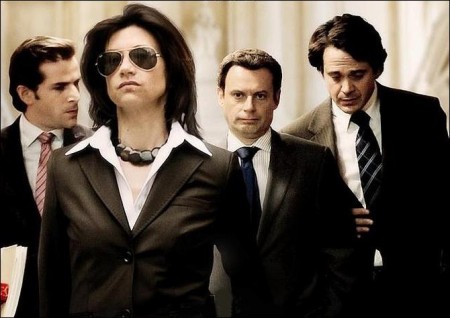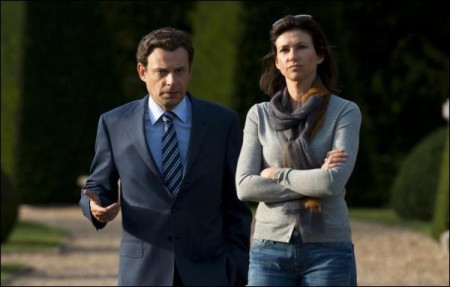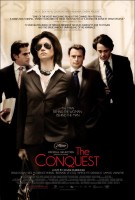Taglines: The man behind the woman behind the man.
The story of “The Conquest,” Xavier Durringer’s lightly fictionalized examination of President Nicolas Sarkozy’s ascent to power in France, may be Shakespearean, as its director insists in the film’s production notes. But the movie, which begins with Mr. Sarkozy’s election-night victory in May 2007, only intermittently rises above the tone of an arch, sniping drawing-room comedy peopled with mild caricatures.
Flashing back and forth from Mr. Sarkozy’s triumphant night to his previous five years of struggle, “The Conquest” is too choppy to build much momentum. It is also too cynical to convey the notion that anything important is at stake beyond personal power. But that may be the point.
If “The Conquest” aspires to be a Gallic answer to “The Queen,” it more closely resembles a diluted, somewhat less amusing French answer to “In the Loop.” From its jaundiced, inside-the-bubble perspective, the political game in France is a circus of competing egomaniacs. Nicola Piovani’s cheerfully galumphing soundtrack, which accompanies Mr. Sarkozy’s staged public appearances, is stylistically identical to Nina Rota’s merry-go-round music for Fellini, for whom Mr. Piovani also composed two scores.
Review for The Conquest
eralded as the French answer to Stephen Frears’s The Queen, a daring portrait of Nicolas Sarkozy’s rise to power, La Conquête (The Conquest) promised to shake up French cinema, no less. Teams of lawyers had to read the script for fear of legal retaliation. How audacious, how brave was the team behind the film, director-writer Xavier Durringer and the producers, the Altmeyer brothers.
La Conquête promised all but delivers little, and sadly falls flat like a cold soufflé. First of all, we don’t learn anything new. No new insight, no daring hypothesis, no cunning analysis on the kind of political animal Nicolas Sarkozy is. Performances by Denis Podalydès, interpreting Sarkozy, and Bernard Le Coq, playing Chirac, may be tremendous, with all the right mimics, tics, grimaces and more importantly the perfect voice intonations, however, La Conquête suffers from a lack of cinéma.
It remains factual, journalistic. Even Nicola Piovani, music composer of Federico Fellini’s later films, could not perform miracles. When the music tries to inject poetry to a film, you know there is a problem. La Conquête doesn’t, for instance, have the grotesque appeal of Paolo Sorrentino’s Il Divo or the lyricism of Marco Bellochio’s Vincere about Mussolini’s rise to power and troubled wife. La Conquête is not a film, it is a best of. A best of Nicolas Sarkozy and Jacques Chirac’s lines between 2002 and 2007.
It also looks as if it never had the ambition of being anything else but an exercise in teasing France’s libel and privacy laws. Sure, we see Denis Podalydès-Nicolas Sarkozy’s jaw drop when he’s told by his advisers that Paris Match is going to publish pictures of his wife Cécilia with her lover Richard Attias in New York, but there’s nothing that touches upon suspicions, denied at the magazine at the time, of his direct influence in the dismissal of the editor. We certainly don’t see him give a call to the head of Paris-Match to demand the editor’s sacking. We hear Cécilia complain of infidelities, but we never see the character in the act.
Perhaps, even more worryingly, La Conquête serves Nicolas Sarkozy’s cause. It depicts a man with boundless energy, proud not to play by the rules, so impudent it almost makes you smile. It portrays a man, half child half Zeus. As for Jacques Chirac and Dominique de Villepin, it shows how wrong and stupid they were to think they could stop the Sarkozy machine.
The Conquest
Directed by: Xavier Durringer
Starring: Denis Podalydès, Nicolas Sarkozy, Florence Pernel, Bernard Le Coq, Michèle Moretti, Samuel Labarthe, Emmanuel Noblet, Dominique Besnehard
Screenplay by: Writers: Patrick Rotman, Xavier Durringer
Cinematography by: Gilles Porte
Film Editing by: Catherine Schwartz
Costume Design by: Jürgen Doering
Art Direction by: Eric Durringer
Studio: Music Box Films
Release Date: November 11, 2011
Hits: 79






